Treasury Secretary Steven Mnuchin told Congress on Wednesday that the Trump administration will never reveal the companies which received loans through the Paycheck Protection Program (PPP).
The Government Accountability Office, a nonpartisan congressional watchdog, told Politico that the Small Business Administration was withholding data on the loan recipients that the agency requested as part of its oversight efforts.
"We believe that that's proprietary information, and in many cases, for sole proprietors and small businesses, it is confidential information," Mnuchin testified Wednesday before the Senate Committee on Small Business and Entrepreneurship.
The decision breaks with standard protocol since the Small Business Administration (SBA) typically discloses the companies that borrowed through the program on which the PPP is based, according to The Washington Post.
"4.5 MILLION businesses received government funds. Zero transparency," a spokesperson for the nonprofit consumer advocacy group Public Citizen tweeted. "Unconscionable, jaw-dropping corruption."
The PPP has received nearly $700 billion in funding from Congress, more than $500 billion of which has already been doled out.
Mnuchin's statement came after the PPP, a coronavirus relief package aimed at helping small businesses pay their workers during the downturn, distributed multi-million-dollar loans to dozens of publicly traded companies.
Though lawmakers from both parties have praised the program for helping small businesses, many of them decried $10 million loans given to companies like Shake Shack and Ruth's Chris Steakhouse, which had large cash reserves. Even the NBA's Los Angeles Lakers got a loan. Those companies later returned the loans.
None of the loans were revealed by the SBA but rather discovered through company announcements. (Disclosure: Salon received a PPP loan to keep our staff and independent journalism at 100%.)
According to an analysis by the Associated Press, more than 75 publicly-traded companies received a combined $300 million in loans from the program. Meanwhile, only 12% of minority-owned businesses, many of which do not have existing relationships with large banks, received the loans for which they applied, according to a recent survey.
The Trump administration decided to distribute the loans through banks rather than the SBA, creating a disparate system which multiple lawsuits from small business owners allege favored large existing clients over smaller firms. Large banks have pocketed more than $10 million in fees from the program.
"I can count on one hand — literally on one hand — the number of businesses in my district who have received assistance," Rep. Adriano Espaillat, D-N.Y., told HuffPost.
Democrats pushed to set aside money for small community banks to distribute to minority communities but Republicans in Congress have pushed back on transparency requirements.
Mnuchin said on Wednesday that about $12 billion had been returned to the program after the administration pressured — but did not require — large companies to pay them back. He said he believed "to a large extent it was from large, public companies and some large sporting teams that I'm a big fan of."
Mnuchin also said the administration would ease PPP rules to allow borrowers with criminal records to obtain loans. He said the administration was open to easing additional rules and promised to create new forms which would make it easier to navigate the process.
Mnuchin previously lowered a threshold requiring borrowers to spend 75% of the loan funds on payroll to 60%. Borrowers who spend less than 60% on payroll will still be eligible for partial loan forgiveness, Mnuchin said Wednesday.
Those moves came in response to issues reported by business owners, who found the program's rules confusing and deterred them from seeking the funds. There is about $130 billion remaining in the program. Mnuchin said the new rules would result in more applications, particularly from restaurants.
He also came out in support of additional funds to help restaurants and hotels.
"I definitely think we are going to need another bipartisan legislation to put more money into the economy," he said.
It is impossible to know which companies returned the loans and which have not since the Trump administration will not release the names.
"The Trump administration has provided no reason why PPP loans should be less transparent" than traditional SBA loans," a spokesperson for the Small Business Committee Democrats told Politico, calling on the agency to "follow precedent on making PPP loan information publicly available."
"How can we know which businesses still need help," Sen. Ben Cardin, D-Md., the top Democrat on the Small Business Committee, said at Wednesday's hearing, "if we do not know which businesses have received help?"
It is also necessary to have the data to identify cases of fraud and corruption.
"Full transparency of PPP data is the only way to quickly and fairly show who is using this program to line their pockets," Rep. Katie Porter, D-Calif., who sits on the House Financial Services Committee, said.
"All money lent and spent must be disclosed online to the public who's footing the bill. How else can we know the program achieved its aims? How else can we ensure these billions did the most good possible in a crisis? How else can we be sure this historic program doesn't become a vehicle for corruption?" R.J. Cross, the tax and budget advocate at the U.S. Public Interest Research Group, a nonpartisan consumer advocacy group, asked. "The biggest bailout in U.S. history demands the most transparency in U.S. history — nothing could be clearer than that."



Shares